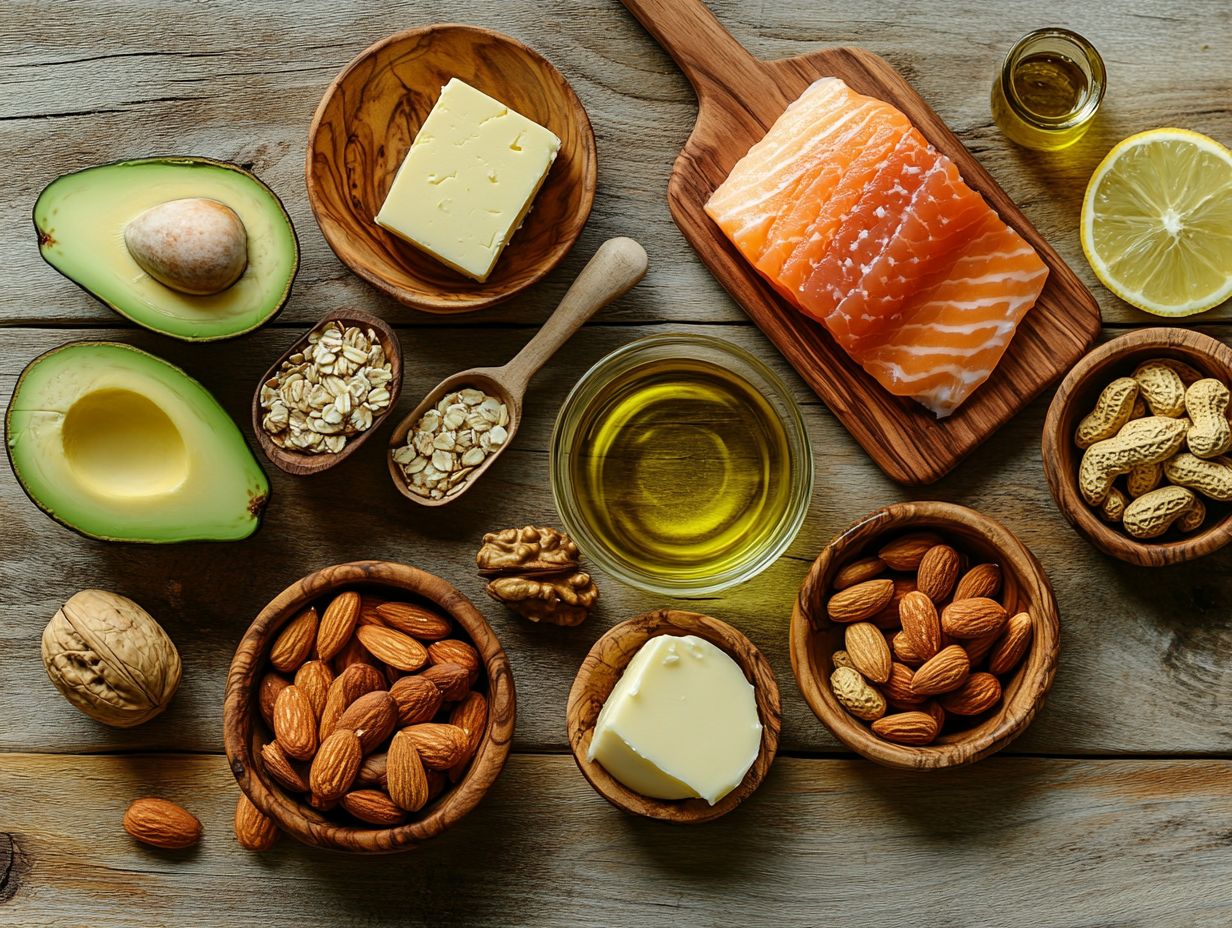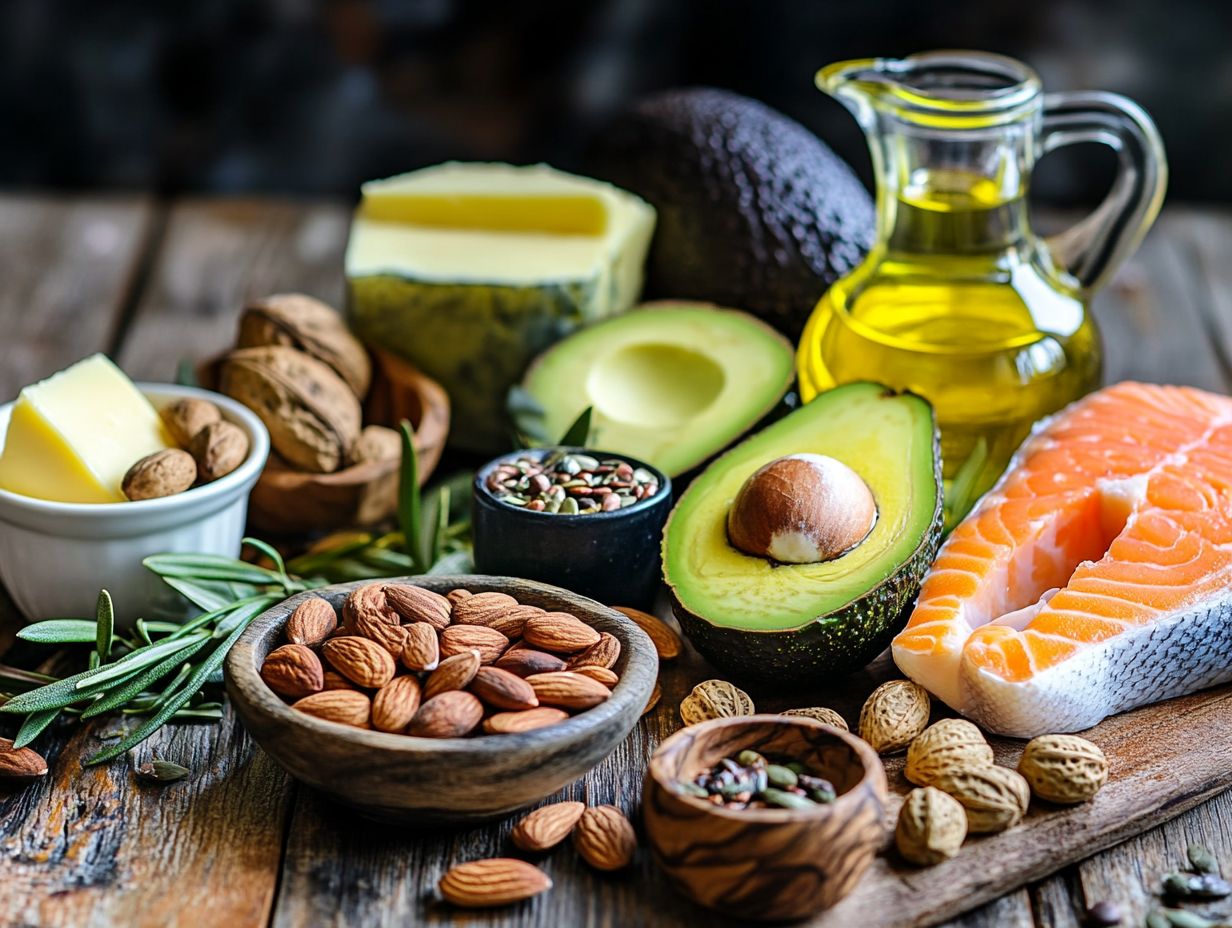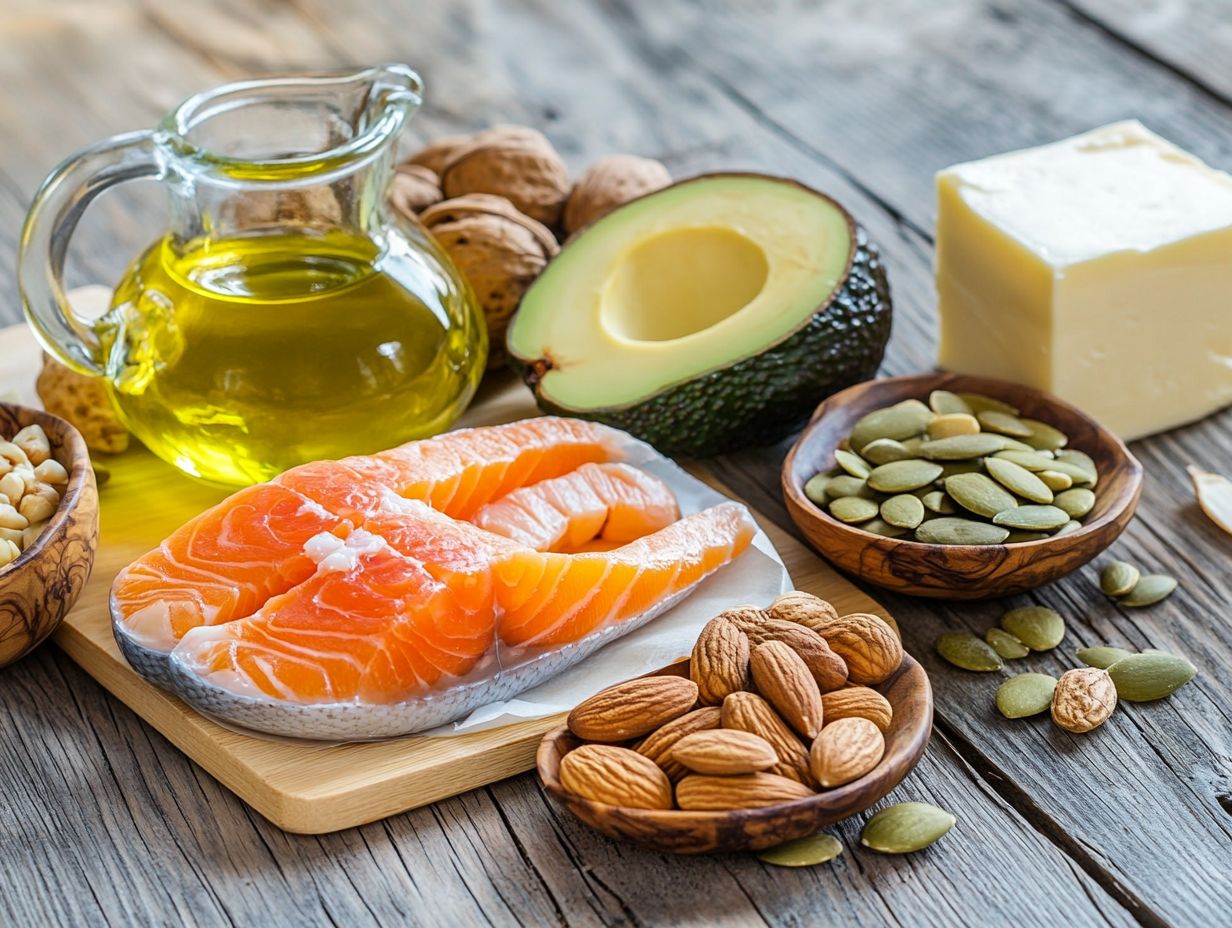What Are the Myths About Fats?
Fats often receive an undeserved negative reputation in the realm of nutrition, yet the reality is much more nuanced. This article delves into the different types of fats, their crucial roles within your body, and the common myths that can obscure your understanding.
You ll discover the truth behind misconceptions that could adversely affect your health and dietary choices, along with practical advice on seamlessly integrating healthy fats into your meals.
You will finish this article with a better understanding of how fats contribute to a balanced lifestyle.
Contents
Key Takeaways:

Fats are essential for our bodies, providing energy and aiding in the absorption of vitamins. Fat-free diets are not necessarily healthier. Instead, focus on incorporating healthy fats, such as omega-3s, into your diet in moderation.
Believing myths about fats can have negative impacts on our health and diet. Don t fall for myths! Understanding the role of fats in your body is key to better health.
Understanding Fats
Understanding fats is essential for making informed food choices that enhance your overall health and wellness.
As a type of nutrient, fats come in various forms, each playing critical roles in your body, such as energy storage, hormone production, and the absorption of fat-soluble vitamins A, D, E, and K.
Knowing the differences between healthy and unhealthy fats can help you manage your cholesterol levels and reduce heart disease risk.
Therefore, grasping their functions and influences on dietary guidelines is vital for navigating your nutritional landscape effectively.
Types of Fats and Their Functions
Fats can be categorized into three main types: saturated fats, monounsaturated fats, and polyunsaturated fats, each with its own unique role in your body.
Saturated fats are typically solid at room temperature and are commonly found in animal products. In contrast, monounsaturated and polyunsaturated fats, such as omega-3 fatty acids, are liquid and generally regarded as healthier options that can help lower bad cholesterol levels.
Saturated fats, often lurking in butter, cheese, and fatty cuts of meat, should be consumed in moderation, as they have the potential to raise LDL cholesterol levels, thereby increasing the risk of heart disease.
On the flip side, monounsaturated fats, which you ll find in delicious foods like olive oil, avocados, and nuts, offer heart-health benefits and can enhance your overall wellness.
Polyunsaturated fats include essential fatty acids such as omega-3s and omega-6s, sourced from fish, flaxseeds, and walnuts. These fats play a vital role in brain function and reducing inflammation. Incorporating these fats into your diet is instrumental in promoting a balanced approach that supports your overall health.
Common Myths About Fats
Common myths surrounding dietary fats can create confusion and lead to poor food choices, often perpetuating the belief that all fats are unhealthy.
You might think that opting for fat-free foods is the most effective strategy for weight loss, but it’s essential to understand that not all fats are the enemy.
In reality, some fats are crucial for a balanced diet, while others can pose serious health risks, such as heart disease. Recognizing this distinction gives you the power to make informed dietary decisions that support your overall health.
Debunking Misconceptions

Debunking misconceptions about dietary fats is crucial for fostering healthier eating habits and enhancing your understanding of nutrition. Many individuals mistakenly believe that all fats, especially saturated and trans fats, should be completely eliminated from their diets.
However, it s important to recognize that healthy fats, like those in avocados and olive oil, play essential roles in maintaining your overall health. Research shows that incorporating healthy fats can support heart health, assist in weight management, and even boost brain function.
Did you know that omega-3 fatty acids, found in fatty fish, help reduce inflammation and lower the risk of chronic diseases?
Confusion often arises around saturated fats found in meat and dairy. While many have labeled them as harmful, emerging studies suggest that moderate consumption might not be as detrimental as once believed.
Trans fats, on the other hand, are clearly linked to heart disease. It’s imperative to differentiate between these types of fats to make informed dietary choices.
Health Implications of Believing These Myths
Embracing myths about dietary fats can have serious health consequences, heightening your risks for heart disease, obesity, and diabetes.
When you misunderstand the roles fats play in your nutrition, it often leads to poor dietary choices. This can contribute to weight gain and unhealthy cholesterol levels, ultimately impacting your long-term health and wellness.
Impact on Diet and Overall Health
The significance of understanding fats in your diet cannot be emphasized enough. Fats are a vital component of a balanced diet and serve as a crucial energy source.
By distinguishing between healthy fats, like those found in nuts and fish, and unhealthy fats, you can improve your cholesterol levels and enhance your health outcomes.
Incorporating healthy fats into your meals can lead to increased energy levels and improved metabolic function. For example, omega-3s from fatty fish or monounsaturated fats from avocados can be seamlessly integrated into your daily routine.
Try tossing a handful of walnuts into a salad or blending flaxseeds into your morning smoothie. These additions not only nourish your body but also promote satiety, helping you manage unhealthy cravings.
Ultimately, a diet rich in wholesome fats paves the way for sustained well-being and a robust defense against chronic diseases.
How to Incorporate Fats into a Healthy Diet
Incorporating healthy fats into your balanced diet requires a solid understanding of dietary guidelines and recommended intake levels. This ensures your food choices enhance your overall wellness.
By prioritizing nutrient-dense sources of healthy fats like avocados, nuts, and fatty fish you can craft meals that support heart health and maintain optimal cholesterol levels.
Recommended Intake and Sources of Healthy Fats

The recommended intake of healthy fats may vary based on individual dietary needs, but including sources like omega-3 fatty acids and monounsaturated fats is essential for your health.
Foods like salmon, olive oil, and almonds provide vital nutrients that support heart health and fit seamlessly into your dietary guidelines.
Aim for healthy fats to make up 20-35% of your daily calories for optimal health! For instance, omega-3 fatty acids are celebrated for enhancing brain function and reducing inflammation.
Monounsaturated fats, abundant in avocados and nuts, can effectively lower bad cholesterol levels, providing significant benefits for your cardiovascular health. Meanwhile, healthy fats like those in walnuts and sunflower oil are essential for your body s functioning.
By incorporating these healthy fats into your meals and snacks, you enhance satiety, support nutrient absorption, and may even improve your mood. They are a vital component of a balanced diet.
Separating Fact from Fiction
Understanding the truth about dietary fats is crucial for your health! Separating fact from fiction in the realm of dietary fats is essential for you to make informed nutritional choices, especially when navigating the sea of misleading dietary myths.
Partnering with a wellness coach or nutritionist can provide you with personalized guidance, clarifying the benefits of healthy fats and helping you make better food choices.
You should seek out reputable sources that present peer-reviewed research and evidence-based guidelines to further discern factual information. Reading nutrition labels shows the types and amounts of fats in the foods you consume, helping you to recognize those sneaky hidden unhealthy fats.
Engaging with qualified professionals, like registered dietitians, ensures you receive tailored advice that suits your unique needs.
It s wise to critically evaluate the credibility of health articles by checking the authors qualifications and the publication date, ensuring the information you rely on is current and relevant. This holistic approach gives you the power to cultivate a balanced dietary perspective and make choices rooted in factual understanding.
Frequently Asked Questions
What Myths Exist About Fats?
There are several myths surrounding fats, including the belief that all fats are bad for you. However, this is not entirely true. Some fats are actually essential for our health and well-being.
Is it true that all fats are unhealthy?

No, this is a common misconception. While trans fats and saturated fats should be limited in our diet, unsaturated fats, such as those found in avocados and nuts, can actually provide health benefits.
Do low-fat or fat-free products mean they are healthier?
Not necessarily. Many low-fat or fat-free products contain added sugars and other unhealthy ingredients to compensate for the reduction in fat. It’s important to read labels and choose whole, unprocessed foods as much as possible.
Are all fats responsible for weight gain?
Contrary to popular belief, not all fats lead to weight gain. Some fats, like omega-3 fatty acids found in fish and certain oils, can actually help with weight loss by promoting satiety and boosting metabolism.
Is it true that a high-fat diet leads to heart disease?
While a diet high in saturated fats can increase the risk of heart disease, it’s important to note that not all fats are created equal. Monounsaturated and polyunsaturated fats have actually been shown to improve heart health when consumed in moderation.
Do fats have any health benefits?
Yes! Certain fats, like omega-3s, are amazing for your health. They have been linked to numerous health benefits, including improved brain function, reduced inflammation, and a lower risk of heart disease.
To learn more about dietary fats and make informed choices, consult reputable sources and consider reaching out to health professionals.





